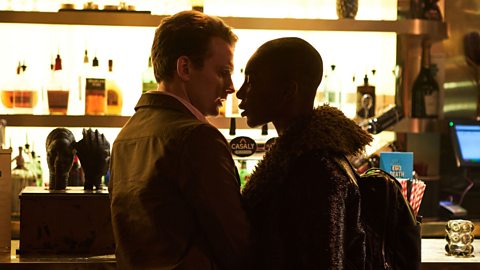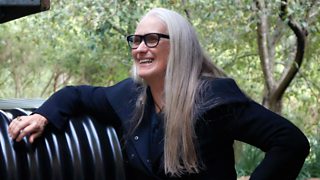Why did the erotic thriller run out of steam?
Back in the 1980s and 90s, everybody was doing it. Erotic thrillers, movies that mixed danger and lots of sex, were big box office winners, with smashes like American Gigolo, Fatal Attraction and Basic Instinct. But now they’ve all but disappeared. In this episode of Screenshot, Mark Kermode and Ellen E. Jones investigate why the erotic thriller ran out of steam.
Ellen speaks to author and critic Karina Longworth, host of the You Must Remember This podcast, who traces the roots of the erotic thriller way back to one of the early greats of cinema. “The earliest master of it is Hitchcock,” she says. “Even before he was making movies like Vertigo and Rear Window, there’s always the sense of a little bit of sexuality and a lot of fear.” In Hitchcock’s time the sex was merely suggested. By the genre’s heyday in the 90s, the sex was front and centre. Longworth defines the 80s/90s variety of erotic thriller as “movies that take sex seriously – maybe too seriously”, which was both their selling point and their downfall. Pre-internet, studios could rely on making big money selling erotic thrillers on VHS. But once the internet made porn easily accessible, erotic thrillers made less financial sense.
Longworth believes the erotic thriller all but died with the release of Stanley Kubrick’s Eyes Wide Shut in 1999. It cast two of the biggest movie stars in the world, then-married couple Tom Cruise and Nicole Kidman, but audiences showed little interest in watching them get it on. “I think it’s a masterpiece,” says Longworth, “but commercially I don’t think it did what anybody wanted it to do… Once you get to that point, Hollywood stops having an incentive to make these movies.”

The death of eroticism
Ellen wonders if the evolution of attitudes towards sex, and especially the treatment of women both on screen and on set, helped kill the genre. “I thought erotic thrillers were dead and I hadn’t really spent much time mourning them,” she says. “That’s partly because of what’s filtered through from actresses like Sharon Stone talking about her unpleasant experiences making Basic Instinct.” Stone has said in interviews that she wasn’t aware that the infamous leg-crossing scene would be as revealing as it was. Maria Schneider, star of Last Tango in Paris, compared her experience of making that film to sexual assault. “Following the Me Too movement, there’s this more cautious industry culture around sex and it makes me wonder if these kinds of films are even possible to make nowadays.”

Movies and TV shows still have sex scenes but there’s now more consideration for everyone’s comfort on set. Ellen talks to intimacy coordinator Ita O’Brien, who has worked on shows including I May Destroy You, Normal People and Ridley Scott’s movie The Last Duel. She says her job is to put in place a process “inviting agreement and consent of touch, simulated sexual content and nudity, and then understanding that any intimate scene where you’ve got two people moving together is a dance. Just like any dance, it needs choreographing.” In essence, it’s her job to make sure a sex scene looks believable and that everyone is comfortable. O’Brien says that the big change in the filming of modern sex scenes is the understanding of how shooting sex affects people. “If some physical contact has happened that is triggering, that can have a really serious, long-lasting effect, a really serious injury. But that injury is emotional and psychological, as opposed to physical… It can be far more long-lasting than, you know, hurting an ankle.” O’Brien doesn’t think this careful consideration of comfort and consent around filming sex means the death of eroticism in film. Quite the opposite. She says the more realistic sex scenes are, because they’ve been properly planned, the sexier. “Let’s have more enjoying the detail of all that,” she says. “As well as thrilling sex scenes, as well as grungy sex scenes. We just open it out and make better work.”

What does an Intimacy Coordinator do?
Ita O'Brien explains the importance of her role on a set.
Ready to evolve
Mark thinks there are some erotic thrillers that deserve another look through a less prudish modern lens. He looks back at Jane Campion’s In the Cut, which was much derided on release in 2003, in part because audiences couldn’t accept Meg Ryan, the romcom princess, as a woman having sex with a detective investigating murders in her neighbourhood. Maria San Filippo, author of Provocateurs and Provocations: Screening Sex In The 21st Century Media, says the negative reaction to the movie in part shows the misogynist attitude that was prevalent in erotic thrillers at the time. “Basic Instinct or Showgirls were all about upping the ante in terms of outrageousness and, honestly, in most cases misogyny,” she says. “In the Cut was so different in that it was investigating misogyny but not endorsing.”
In the Cut was so different in that it was investigating misogyny but not endorsing.Maria San Filippo on Jane Campion's 2003 film
The erotic thriller hasn’t entirely disappeared. Mark names Paul Verhoeven’s Elle and David Fincher’s Gone Girl as more recent movies that could be considered erotic thrillers. They’re both directed by men, but both put a woman in charge of her own sexuality. Maybe the erotic thriller isn’t over. Maybe it’s ready to evolve, but this time making sure it’s not just the men who leave satisfied.
More from Βι¶ΉΤΌΕΔ Radio 4
-
![]()
Screenshot - The Erotic Thriller
Ellen E Jones and Mark Kermode explore cinema's steamiest genre, the erotic thriller, 30 years on from the release of Basic Instinct.
-
![]()
Moving Image - Carol Morley on Jane Campion
Francine Stock talks to director Carol Morley about the film that has influenced her the most, Jane Campion's debut Sweetie.
-
![]()
This Cultural Life - Nicole Kidman
Oscar winning actor Nicole Kidman discusses the experiences that shaped her creative life.
-
![]()
Grounded with Louis Theroux - Michaela Coel
Louis speaks to actor and writer Michaela Coel.





